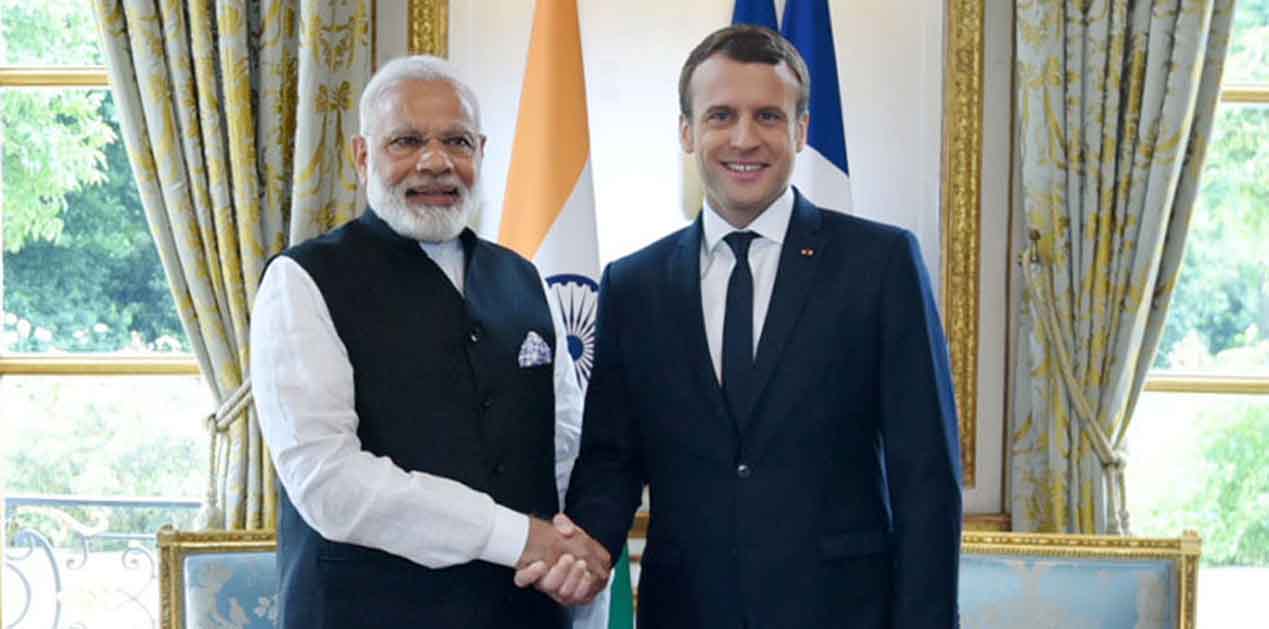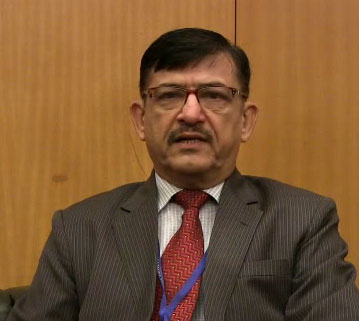Among the many facets of India-France bilateral relations, cooperation in the maritime domain has been high on the agenda. Maritime security with strong constabulary elements, exchange of information on White Shipping, Varuna series of naval exercises that have been creatively conceptualized and expanded, regular port calls by naval ships and training activities, and high level naval exchanges have figured prominently in the matrix of bilateral cooperation. The political leadership on either side appear quite satisfied with the pace and content of engagements of their navies and are confident to expand the ‘cooperation envelop’ to include newer vistas.
During Prime Minister Modi’s recent visit to France both sides welcomed implementation of the Memorandum of Understanding between the Indian Space Research Organisation (ISRO) and Centre National D'etudes Spatiales (CNES) of France for co-developing a maritime surveillance satellite system for Indian Ocean.1 It is planned to jointly launch a constellation of 8 to 10 satellites over the next five years as also set up a maritime surveillance centre in India.2
This system would significantly strengthen Maritime Domain Awareness (MDA) in the Indian Ocean region and facilitate monitoring shipping traffic as also respond to any disruption in safe flow of commerce due terrorism, piracy, drug smuggling, gun running and illegal unreported and unregulated (IUU) fishing. The satellite constellation will complement the operations of the Information Fusion Centre – Indian Ocean Region (IFC-IOR) located in Gurugram, India which collates, fuses and disseminates intelligence and information about White Shipping in the Indian Ocean involving 30,000 to 40,000 merchant ships. In this context, under the White Shipping agreement, a French liaison officer will be embedded at the IFC.3
A similar information sharing mechanism, Critical Maritime Routes (CMR), is funded by the European Union and is operational.4 It enables exchange of information and facilitates cooperation and capacity building to enhance maritime security and safety in three specific regions; Western Indian Ocean; Southeast Asia; and Gulf of Guinea. It is fair to assume that India-France maritime satellite project can be networked with the CMR. These, along with many other similar mechanisms currently operational in the Indian Ocean have helped navies, coast guards and law enforcement agencies to potentially deter merchant ships going ‘dark’ or those planning to hide sailing tracks and remain incommunicado.
The Indian government has successfully integrated MDA in its foreign and security policy discourse and the issue finds reference in bilateral and multilateral agenda as also through multilateral institutions. These issues feature prominently during discussions in multilateral arrangements such as the Indian Ocean Rim association (IORA) and the Indian Ocean Naval symposium (IONS). France will be working closely with India over which it will preside from 2020 to 2022.
India shares White Shipping information with over 30 countries to promote MDA.5 It also has institutionalized similar mechanisms for exchange of intelligence and information among respective security agencies of other countries such as the US, UK and Indian Ocean island states particularly Mauritius, Seychelles, Maldives and Sri Lanka. In te case of the island states, under a capacity building programme, since 2013 India provides information relating to MDA based on Long Range Identification and Tracking (LRIT), Merchant Ship Information System (MSIS) and Automatic Identification System (AIS). The maritime cooperation also includes Search and Rescue (SAR) coordination and training and naval exercises called ‘Dosti’.
Although it is tempting to suggest that the India-France satellite project would also monitor Chinese naval activity in the Indian Ocean, it is fair to argue that India and France are not tied into a military alliance unlike the Five Eyes programme, a signal intelligence sharing alliance wherein English-speaking allies (Australia, Canada, New Zealand, the United Kingdom and the United States) have joint cooperation in signals intelligence.6
Finally, maritime security is not the responsibility of one country alone; instead, India-France maritime-space cooperation should be seen as commitment by both countries to deliver ‘public good at sea’ through enhanced MDA. This resonates in their shared vision on maritime security and is displayed by both sides commitment to upholding order at sea. It is also the rationale for working together with other like-minded states for maritime security in the Indian Ocean to enhance regional stability.
(Dr Vijay Sakhuja is former Director National Maritime Foundation, New Delhi)
(The paper is the author’s individual scholastic articulation. The author certifies that the article/paper is original in content, unpublished and it has not been submitted for publication/web upload elsewhere, and that the facts and figures quoted are duly referenced, as needed, and are believed to be correct). (The paper does not necessarily represent the organisational stance... More >>
Notes
- India-France Joint Statement on Visit of Prime Minister to France (22-23 August 2019), https://mea.gov.in/bilateral-documents.htm?dtl/31755/IndiaFrance+Joint+Statement+on+Visit+of+Prime+Minister+to+France+2223+August+2019 (accessed 23 August 2019). Also see India-France Joint Statement during State visit of President of France to India (March 10, 2018) https://pib.gov.in/newsite/PrintRelease.aspx?relid=177251 (accessed 23 August 2019).
- “Prime Minister Modi visit to France: Launch of satellites for maritime surveillance in Indo-Pacific key Agenda”, https://indianexpress.com/article/india/pm-modi-visit-to-france-launch-of-satellites-for-maritime-surveillance-in-indo-pacific-key-agenda-5918684/ (accessed 23 August 2019)
- India-France Joint Statement on Visit of Prime Minister to France (22-23 August 2019), https://mea.gov.in/bilateral-documents.htm?dtl/31755/IndiaFrance+Joint+Statement+on+Visit+of+Prime+Minister+to+France+2223+August+2019 (accessed 23 August 2019).
- “Critical Maritime Routes Programme”, https://criticalmaritimeroutes.eu/mission/ (accessed 23 August 2019).
- “India signs ascension pact to the 30-member Trans Regional Maritime Network”, https://economictimes.indiatimes.com/news/defence/india-signs-ascension-pact-to-the-30-member-trans-regional-maritime-network/articleshow/67037915.cms?from=mdr (accessed 23 August 2019).
- Scarlet Kim and Paulina Perlin, “Newly Disclosed NSA Documents Shed Further Light on Five Eyes Alliance”, https://www.lawfareblog.com/newly-disclosed-nsa-documents-shed-further-light-five-eyes-alliance (accessed 23 August 2019).
Image Source: https://www.pmindia.gov.in/wp-content/uploads/2017/06/s20170603104210.jpg











Post new comment